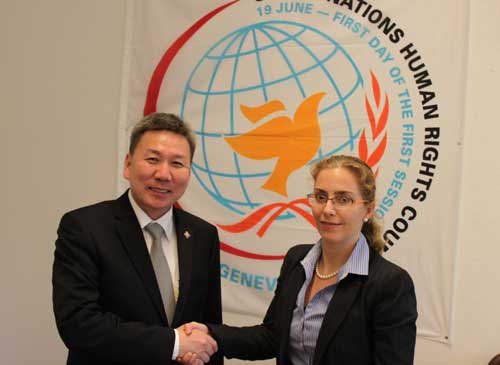ID :
260911
Thu, 10/25/2012 - 12:04
Auther :
Shortlink :
https://www.oananews.org//node/260911
The shortlink copeid
FM DELIVERS SPEECH AT UPR'S SESSION

Ulaanbaatar, Mongolia /MONTSAME/ In Switzerland with a working visit, the Minister of Foreign Affairs L.Bold delivered a speech at the 14th session of the Universal Periodic Review (UPR) Working Group which began at the Human Rights Council in Geneva.
The United Nations Human Rights Council was established by the United Nations General Assembly on 15 March 2006 by resolution 60/251. Its first session took place from 19 to 30 June 2006. One year later, the Council adopted its "Institution-building package" to guide its work and set up its procedures and mechanisms.
Among them were the Universal Periodic Review mechanism which serves to assess the human rights situations in all United Nations Member States, the Advisory Committee which serves as the Council's “think tank” providing it with expertise and advice on thematic human rights issues and the Complaint Procedure which allows individuals and organizations to bring human rights violations to the attention of the Council.
The Council is made up of 47 United Nations Member States which are elected by the UN General Assembly. The Human Rights Council replaced the former United Nations Commission on Human Rights.
The Human Rights Council also works with the UN Special Procedures established by the former Commission on Human Rights and now assumed by the Council. These are made up of special rapporteurs, special representatives, independent experts and working groups that monitor, examine, advise and publicly report on thematic issues or human rights situations in specific countries.
The Council is an inter-governmental body within the United Nations system responsible for strengthening the promotion and protection of human rights around the globe and for addressing situations of human rights violations and make recommendations on them. It has the ability to discuss all thematic human rights issues and situations that require its attention throughout the year. It meets at the UN Office at Geneva.
In accordance with a resolution of the UN General Assembly, the Council started discussion of national reports on human rights situations of nations from 2008. In four years, reports of 198 nations have been considered.
From the year 2012, the discussion's second phase started, and reports of 14 countries will be discussed at the meeting to continue until November 5, 2012. It will focus attention to implementation of recommendations given to those nations considered at the previous stage's discussion, and measures for realizing them.
Mongolia's first national report on human rights was discussed in 2010, and it is planned to consider the next report in 2015.
** ** **
The same day, L.Bold held a meeting with Ms Laura Dupuy Lasserre, the UNHRC President in the UN Headquarters in Geneva.
They shared views on Mongolia's participation in the multilateral system of protecting and ensuring human rights and on cooperation matters. L.Bold said that ensuring and protecting of human rights is one of the foreign policy's pillars, and affirmed that the government of Mongolia attached a great importance to human rights issues. He said Mongolia officially nominated for a membership of the Human Right Council for 2016-2018 in order to make contributions at regional and international levels.
The Minister went on that Mongolian parliament has ratified the Second Optional Protocol to the International Covenant on Civil and Political Rights, aiming at the abolition of the death penalty after the State Head Elbegdorj had banned the death penalty in Mongolia. In addition, L.Bold said Mongolia is closely cooperating with the Office of the United Nations High Commissioner for Human Rights within its chairmanship of the Community of Democracies (CoD).
In response, Ms Lasserre congratulated Mongolia on becoming a good example for ensuring human rights, and wished Mongolia luck in being elected as a member of the HRC.
B.Khuder





